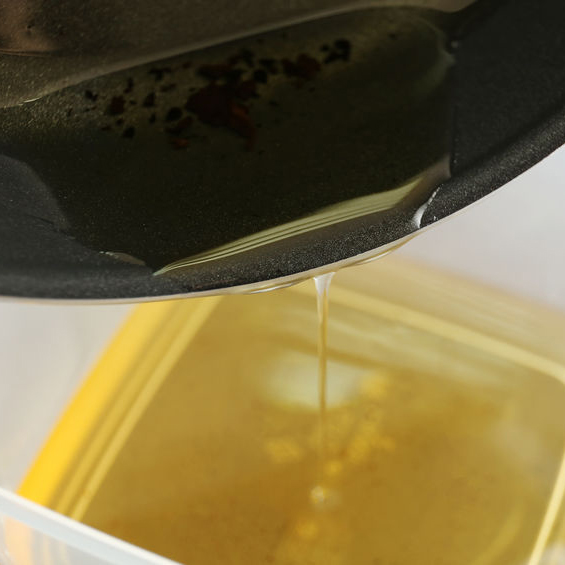
How to get rid of oil and grease?
With Thanksgiving in the very near future, our minds are thinking about turkey and dressing, and all the fixings, including pies, puddings, and turkey. Roasted turkey has been the standby for decades upon decades for most American households. In recent years, deep-fried turkey has entered the playing field, making its own traditions, and who could complain?! Oh, but then there is all that left-over oil/grease. Recycling comes to mind.
We will talk about grease recycling a bit more, but do you know the difference between cooking oil and grease? If you’re not an experienced cook, you may think they are the same, but there is a difference.
Is vegetable oil a grease?
Yes, but not right away. Vegetable oil is a room-temperature liquid and grease is that oil in a used format and contains the high free fatty acids and other solids from the food cooked in that oil.
Vegetable cooking oil is used for preparing food, but not necessarily for cooking in it. We use it for flavoring in making bread dips, salad dressings, and more. It is a fat that comes from animals, plants, or synthetic fat commonly used for frying foods – like that deep-fried turkey on Thanksgiving – and baking, and more.
Can you recycle grease?
Car grease – yes. Cooking grease – yes and no. If you’re planning on doing that deep-fry turkey dinner this year or use bacon grease to brown the Brussels sprouts so the kids will eat them, you want to make sure you get rid of that grease the right way. So that is grease recycling, right?
For generations, women have cooked many foods in leftover used cooking oil and cooking grease. It adds flavor to many dishes, and we have eaten it for generations. They stored that used grease or oil in containers, some had strainers, and refrigerate it until they needed it. A form of grease recycling? This was before society and medical journals found it was slowly killing us. Besides, times were hard, they reused anything they could. They couldn’t pour down the kitchen disposal or drain, mainly because many years ago, garbage disposals didn’t exist yet.
Today, with all the modern conveniences in kitchens, like the garbage disposal and the plumbing system, we shouldn’t be pouring grease out in the sink now. For grease recycling containers, we must improvise. If the old way of grease recycling and using it bothers you, the steps to follow to dispose of that leftover cooking grease or deep-fried turkey oil is:
- Let it cool completely
- Pour it into a durable container with a lid
- Place that container in a zip-lock plastic bag
- Place in the household trash
What you shouldn’t do with your leftover grease or oil is pour it down the sink, toilet, or loose in the trashcan, whether it is still hot or after it has cooled.
What happens recycled grease?
Americans produce almost 3 billion gallons of used cooking oil annually. This has created a major issue for disposing of it. There is a proper way for homes, hotels, hospitals, and restaurants are, and hotels to get rid of their used cooking oil by using various grease recycling centers. This keeps that used grease or oil from entering the environment through landfills, sewer systems, and trashcans.
Grease recycling is a renewable energy source, so the cook of the house can contribute to making a sustainable contribution to the Earth. Did you know that cooking oil used as fuel now? Yes, that used grease from your Thanksgiving turkey or that last fish fry of the summer can be turned into both biodiesel and diesel fuel as renewable energy. It is then used to power the diesel engines in farm equipment, public transportation, and trucks. In some areas of the country, they use that used cooking oil as an energy source for heating homes.
Grease recycling is one way to protect our environment from climate change by using it for biodiesel, which reduces emissions from greenhouse gases drastically. Because biodiesel isn’t environmentally harmful and is a cost-effective way to produce, it gives us more supply and burns cleaner.
Because there isn’t any widely known used cooking oil/grease recycling for residents, you can contact your local city and ask if they have a collection point where you can take yours.
How do I dispose of oil?
As we discussed earlier in this article, and it is worth repeating, the following steps are recommended for disposing of your used cooking oil:
- Let it cool completely
- Pour it into a durable container with a lid
- Place that container in a zip-lock plastic bag
- Place in the household trash
If you decide to save your used cooking oil and do the old fashion grease recycling, filter it using a coffee filter, pouring into your designated cooking oil recycling container and then store it in the refrigerator. Do not use more than twice, and then use the steps above to dispose of it. When cooking oil is reused more than twice, it reduces the smoke point and will burn easier and faster.

Where can I recycle cooking oil?
If the old school way of cooking oil and grease recycling isn’t your thing, but you don’t want to put it in the trash can as the steps we listed instruct, then contact the city office and ask them about their grease recycling program. If they have nothing in place, contact local trash companies and ask if they have public bins for your used cooking oil, even the local fire station may have answers. Want to learn more about cooking oil and grease recycling in Fort Pierce and Port St. Lucie, Fl? Call KRK Enterprises, Inc. today at 800-330-7686!

